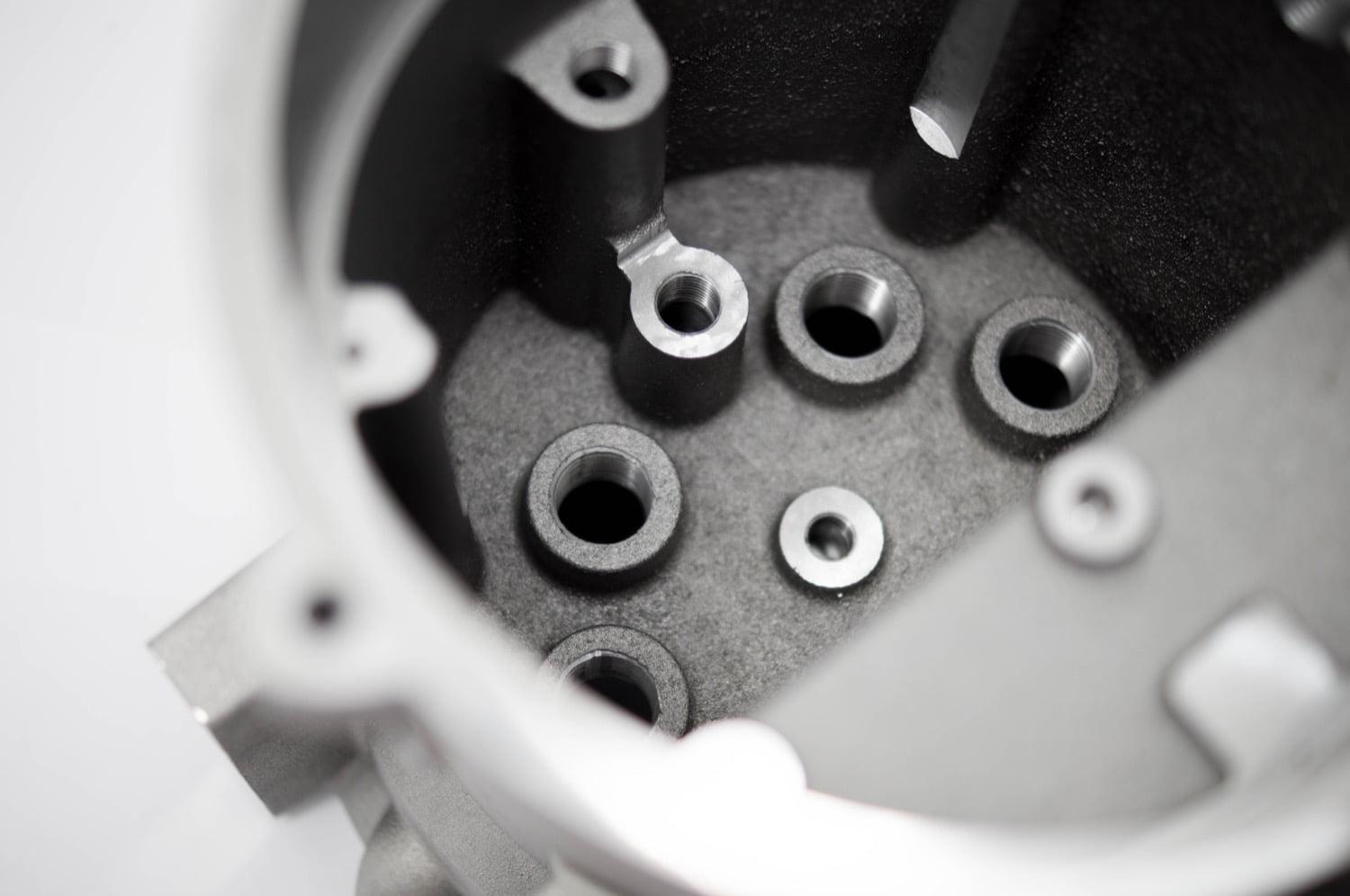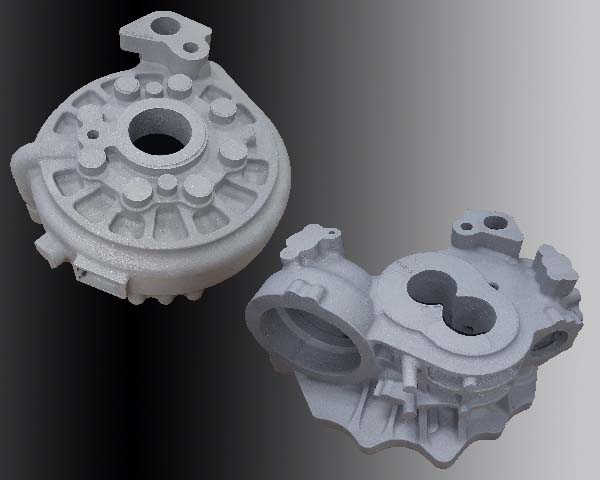Key features that make Precision aluminum casting a trusted choice in metalworking
Wiki Article
Exploring the Ingenious Procedures Behind Modern Light Weight Aluminum Shop Operations
Modern light weight aluminum factory operations are undertaking significant improvement. Automation and AI are improving production techniques, improving both performance and precision. The integration of 3D printing is improving mold creation, while sustainability methods are coming to be more vital. Each of these innovations plays an essential role in redefining the market. However, the ramifications of these modifications extend past plain production effectiveness. What chances and obstacles lie in advance for light weight aluminum factories in this evolving landscape?The Role of Automation in Aluminum Foundries

Furthermore, automation adds to improved safety and security standards within the shop environment. By transferring hazardous jobs to makers, human employees can concentrate on managerial duties and quality assurance, decreasing the danger of crashes. In addition, data analytics obtained from automated procedures supply valuable insights right into functional efficiency, resulting in better decision-making and continuous renovation. As the demand for aluminum products expands, the adoption of automation technologies will likely expand, even more changing the landscape of light weight aluminum foundry operations.
Advancements in Casting Technologies
Current improvements in casting modern technologies are transforming light weight aluminum shop procedures. Technologies such as 3D printing assimilation, progressed alloy solutions, and automated procedure optimization are enhancing effectiveness and product quality. These growths are essential in satisfying the progressing needs of the sector.3D Printing Assimilation
Incorporating 3D printing technology into light weight aluminum foundry operations has revolutionized conventional spreading methods, boosting both efficiency and accuracy. This ingenious approach enables the rapid production of intricate mold and mildews and cores, greatly reducing lead times and product waste. By using additive production, factories can create intricate geometries that were impossible or formerly challenging to attain with conventional methods. The flexibility of 3D printing additionally allows fast layout modifications, promoting an extra agile manufacturing procedure. Furthermore, this combination sustains using lightweight structures, which is increasingly crucial in markets such as automotive and aerospace. As light weight aluminum shops remain to adopt 3D printing, they place themselves at the center of technical improvement, driving improvements in item high quality and functional capacities.Advanced Alloy Formulations
The development of innovative alloy solutions has actually significantly boosted casting technologies in light weight aluminum shop procedures. These formulas incorporate various components, such as silicon, copper, and magnesium, to boost mechanical buildings and thermal resistance. By tailoring the composition of aluminum alloys, producers can attain details efficiency features that meet the needs of varied applications, from auto components to aerospace frameworks. Using innovative alloys additionally adds to reduced weight and enhanced stamina, which are essential consider contemporary design. In addition, developments in alloy advancement make it possible for better fluidness during casting, causing enhanced surface finishes and lowered defects. In general, advanced alloy formulas represent a substantial jump onward, positioning light weight aluminum foundries to satisfy the evolving needs of various sectors successfully.Automated Process Optimization
Developments in casting innovations have actually led the way for computerized process enhancement in light weight aluminum foundry operations. By integrating sophisticated software and real-time data analytics, shops can currently enhance production procedures and improve quality assurance. Automated systems keep an eye on variables such as temperature, air conditioning, and stress rates, permitting instant changes that minimize defects and waste. Additionally, maker learning formulas analyze historic performance information to predict suitable setups, thereby raising performance and lowering cycle times. Robotics likewise play a substantial duty, managing repeated tasks that improve safety and precision. In general, these advancements not just drive functional effectiveness however likewise enable shops to satisfy the expanding need for top notch light weight aluminum components in numerous markets.Smart Manufacturing and Industry 4.0 Combination
The integration of Smart Production and Market 4.0 within aluminum factories is transforming operational performance. By leveraging IoT modern technologies, automation, and robotics, shops can enhance manufacturing processes and reduce downtime. Furthermore, information analytics offers critical understandings that improve decision-making and drive continual renovation.IoT in Factory Procedures
As manufacturers progressively embrace the Web of Points (IoT), foundry procedures are experiencing a transformative shift in the direction of clever manufacturing and Sector 4.0 integration. Precision aluminum casting. IoT innovations allow real-time data collection and evaluation, boosting decision-making processes and operational efficiency. Sensing units and connected tools monitor tools efficiency, product usage, and environmental problems, enabling positive upkeep and resource optimization. This connection cultivates an extra nimble manufacturing atmosphere, where adjustments can be made quickly in action to market needs. Furthermore, IoT assists in improved traceability and high quality control, as data from the entire production cycle can be quickly accessed and analyzed. In general, the assimilation of IoT in factory procedures significantly boosts efficiency and drives advancement in light weight aluminum manufacturing proceduresAutomation and Robotics Assimilation
Automation and robotics assimilation is revolutionizing aluminum foundry procedures by boosting effectiveness and precision. This transformative method enhances processes such as molding, putting, and finishing, decreasing human error and raising output uniformity. By using sophisticated robot systems, foundries can achieve greater production rates while preserving stringent high quality criteria. Automated systems additionally allow real-time surveillance and flexible control, permitting for speedy modifications to production specifications. In addition, the assimilation of robotics minimizes labor prices and mitigates safety and security threats related to hands-on handling of liquified metal. As shops accept smart production principles integral in Industry 4.0, the synergy between automation and robotics solidifies their competitive side, leading the way for lasting development and innovation in the light weight aluminum spreading market.Data Analytics for Efficiency
Taking advantage of information analytics considerably boosts efficiency within light weight aluminum shop operations, lining up with clever production and Market 4.0 principles. By leveraging real-time information collection and evaluation, foundries can keep track of manufacturing processes, anticipate equipment failings, and maximize resource allocation. This data-driven strategy assists in informative decision-making, enabling managers to enhance and recognize bottlenecks workflow. In addition, anticipating analytics encourages foundries to expect market needs, consequently reducing waste and making sure prompt item distribution. Integration of data analytics with IoT tools enhances functional presence, cultivating an aggressive upkeep society. Eventually, implementing these sophisticated logical methods not just boosts productivity yet also drives innovation, positioning light weight aluminum foundries to meet the progressing needs of the industry while keeping competitive edges in a quickly changing landscape.Sustainable Practices in Aluminum Casting
While the aluminum spreading market has typically encountered ecological difficulties, lots of foundries are now adopting sustainable techniques to reduce their effect (aluminum casting). A significant focus has gotten on recycling light weight aluminum scrap, which not only minimizes waste but additionally saves power compared to main light weight aluminum production. Innovative melting innovations, such as induction heaters, boost energy efficiency and lower greenhouse gas exhaustsIn addition, factories are executing closed-loop water supply to decrease water intake and click here for info lower thermal pollution. Making use of environment-friendly binders in mold-making procedures is obtaining grip, more reducing hazardous exhausts.
Some centers are investing in eco-friendly power sources to power procedures, aligning with international sustainability goals. By incorporating these methods, the light weight aluminum spreading market is developing towards a much more environmentally liable future, showing that financial development can coexist with environmental stewardship - Aluminum Foundry. These efforts mirror a dedication to sustainability and the significance of ecological accountability in production
Quality Control Innovations
As the light weight aluminum casting sector developments in the direction of sustainability, the value of quality assurance innovations becomes progressively obvious. Modern aluminum factories are adopting sophisticated technologies to boost their quality control procedures. Techniques such as real-time surveillance and information analytics allow makers to spot inconsistencies and issues early in the manufacturing cycle. Executing automated evaluation systems geared up with device discovering algorithms warranties that items fulfill strict high quality requirements while decreasing human mistake.The integration of non-destructive testing techniques, such as ultrasonic and radiographic evaluations, offers deeper understandings into the integrity of spreadings without harming the material. These advancements not just improve product reliability however also reduce Check This Out waste, straightening with sustainability objectives. Additionally, the adoption of standard quality frameworks helps improve operations throughout various foundries, ensuring consistency in output. Jointly, these improvements are reshaping quality assurance, cultivating a culture of excellence within the aluminum spreading sector.
Future Patterns in Light Weight Aluminum Foundry Operations
What advancements exist in advance for aluminum factory operations? The future of aluminum foundries is positioned for transformation via developments in automation, expert system, and lasting techniques. The combination of robotics and automated systems is anticipated to boost performance and accuracy in the spreading procedures, decreasing human mistake and labor expenses. In addition, AI-driven analytics will certainly enable real-time tracking and anticipating upkeep, maximizing operational efficiency and decreasing downtime.Sustainability remains a prime focus, with shops progressively adopting green practices, such as using recycled light weight aluminum and creating low-emission melting technologies. Innovations in 3D printing are likewise expected to transform mold-making, enabling for intricate geometries and reduced product waste. As the market accepts digitalization, data-driven decision-making will become critical, making it possible for factories to react swiftly to market demands. Jointly, these fads guarantee to redefine aluminum foundry procedures, making them extra reliable, sustainable, and adaptable to future challenges.

Frequently Asked Questions
What Safety Steps Are Applied in Light Weight Aluminum Foundry Procedures?
Aluminum shop operations execute various safety steps, including individual safety devices, ventilation systems to take care of fumes, regular security training, emergency feedback plans, and stringent tracking of temperature level and devices to avoid accidents and guarantee worker safety.Just How Do Foundries Handle Labor Force Educating for New Technologies?

What Materials Are Commonly Recycled in Light Weight Aluminum Foundries?
Light weight aluminum shops generally recycle scrap aluminum, including post-consumer items like beverage containers, automotive parts, and construction products. This recycling procedure lowers waste and saves sources, adding to an extra sustainable light weight aluminum production sector.How Does Light Weight Aluminum Casting Impact the Setting?
Aluminum casting influences the atmosphere via energy-intensive processes, greenhouse gas discharges, and prospective neighborhood contamination. Innovations in reusing and lasting practices can alleviate these results, advertising an extra environment-friendly approach to light weight aluminum production.What Are the Normal Lead Times for Light Weight Aluminum Spreading Projects?
Typical preparation for light weight aluminum casting tasks vary significantly, typically varying from 2 to six weeks. Aspects affecting these timelines include complexity, order size, and product schedule, affecting overall manufacturing schedules in shop operations.
Automation significantly plays a necessary duty in aluminum shops, improving efficiency and accuracy in the production process. Advancements in casting technologies have paved the way for computerized procedure improvement in light weight aluminum foundry operations. Using information analytics considerably enhances efficiency within aluminum foundry operations, straightening with wise production and Sector 4.0 concepts. A significant emphasis has actually been on recycling aluminum scrap, Go Here which not just minimizes waste yet also preserves power contrasted to key light weight aluminum manufacturing. Aluminum factories frequently recycle scrap aluminum, including post-consumer items like drink cans, auto parts, and construction materials.
Report this wiki page